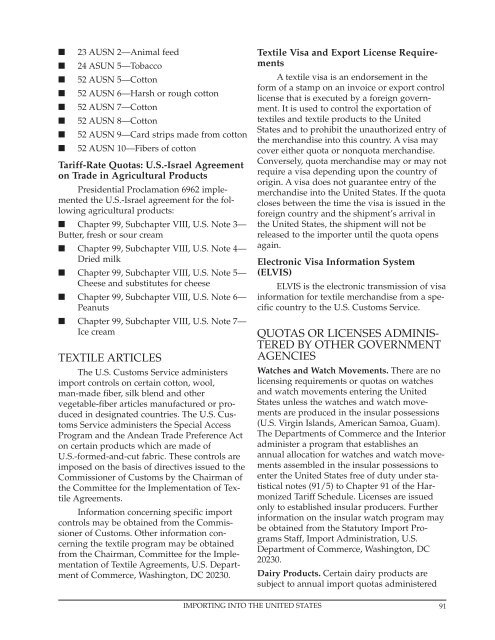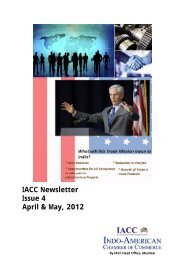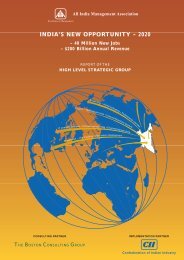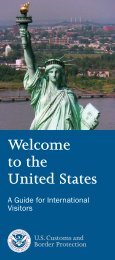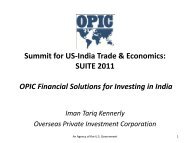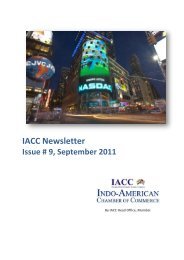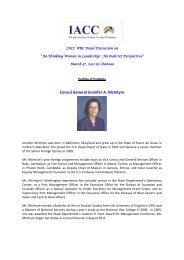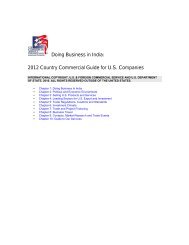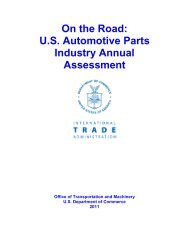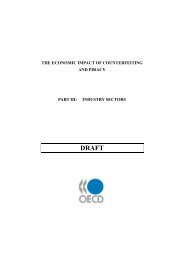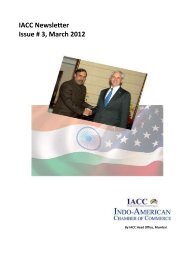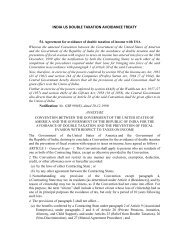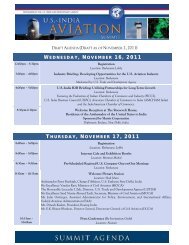Importing into the United States - Indo-American Chamber Of ...
Importing into the United States - Indo-American Chamber Of ...
Importing into the United States - Indo-American Chamber Of ...
You also want an ePaper? Increase the reach of your titles
YUMPU automatically turns print PDFs into web optimized ePapers that Google loves.
■<br />
■<br />
■<br />
■<br />
■<br />
■<br />
■<br />
■<br />
23 AUSN 2—Animal feed<br />
24 ASUN 5—Tobacco<br />
52 AUSN 5—Cotton<br />
52 AUSN 6—Harsh or rough cotton<br />
52 AUSN 7—Cotton<br />
52 AUSN 8—Cotton<br />
52 AUSN 9—Card strips made from cotton<br />
52 AUSN 10—Fibers of cotton<br />
Tariff-Rate Quotas: U.S.-Israel Agreement<br />
on Trade in Agricultural Products<br />
Presidential Proclamation 6962 implemented<br />
<strong>the</strong> U.S.-Israel agreement for <strong>the</strong> following<br />
agricultural products:<br />
■ Chapter 99, Subchapter VIII, U.S. Note 3—<br />
Butter, fresh or sour cream<br />
■ Chapter 99, Subchapter VIII, U.S. Note 4—<br />
Dried milk<br />
■ Chapter 99, Subchapter VIII, U.S. Note 5—<br />
Cheese and substitutes for cheese<br />
■ Chapter 99, Subchapter VIII, U.S. Note 6—<br />
Peanuts<br />
■ Chapter 99, Subchapter VIII, U.S. Note 7—<br />
Ice cream<br />
TEXTILE ARTICLES<br />
The U.S. Customs Service administers<br />
import controls on certain cotton, wool,<br />
man-made fiber, silk blend and o<strong>the</strong>r<br />
vegetable-fiber articles manufactured or produced<br />
in designated countries. The U.S. Customs<br />
Service administers <strong>the</strong> Special Access<br />
Program and <strong>the</strong> Andean Trade Preference Act<br />
on certain products which are made of<br />
U.S.-formed-and-cut fabric. These controls are<br />
imposed on <strong>the</strong> basis of directives issued to <strong>the</strong><br />
Commissioner of Customs by <strong>the</strong> Chairman of<br />
<strong>the</strong> Committee for <strong>the</strong> Implementation of Textile<br />
Agreements.<br />
Information concerning specific import<br />
controls may be obtained from <strong>the</strong> Commissioner<br />
of Customs. O<strong>the</strong>r information concerning<br />
<strong>the</strong> textile program may be obtained<br />
from <strong>the</strong> Chairman, Committee for <strong>the</strong> Implementation<br />
of Textile Agreements, U.S. Department<br />
of Commerce, Washington, DC 20230.<br />
Textile Visa and Export License Requirements<br />
A textile visa is an endorsement in <strong>the</strong><br />
form of a stamp on an invoice or export control<br />
license that is executed by a foreign government.<br />
It is used to control <strong>the</strong> exportation of<br />
textiles and textile products to <strong>the</strong> <strong>United</strong><br />
<strong>States</strong> and to prohibit <strong>the</strong> unauthorized entry of<br />
<strong>the</strong> merchandise <strong>into</strong> this country. A visa may<br />
cover ei<strong>the</strong>r quota or nonquota merchandise.<br />
Conversely, quota merchandise may or may not<br />
require a visa depending upon <strong>the</strong> country of<br />
origin. A visa does not guarantee entry of <strong>the</strong><br />
merchandise <strong>into</strong> <strong>the</strong> <strong>United</strong> <strong>States</strong>. If <strong>the</strong> quota<br />
closes between <strong>the</strong> time <strong>the</strong> visa is issued in <strong>the</strong><br />
foreign country and <strong>the</strong> shipment’s arrival in<br />
<strong>the</strong> <strong>United</strong> <strong>States</strong>, <strong>the</strong> shipment will not be<br />
released to <strong>the</strong> importer until <strong>the</strong> quota opens<br />
again.<br />
Electronic Visa Information System<br />
(ELVIS)<br />
ELVIS is <strong>the</strong> electronic transmission of visa<br />
information for textile merchandise from a specific<br />
country to <strong>the</strong> U.S. Customs Service.<br />
QUOTAS OR LICENSES ADMINIS-<br />
TERED BY OTHER GOVERNMENT<br />
AGENCIES<br />
Watches and Watch Movements. There are no<br />
licensing requirements or quotas on watches<br />
and watch movements entering <strong>the</strong> <strong>United</strong><br />
<strong>States</strong> unless <strong>the</strong> watches and watch movements<br />
are produced in <strong>the</strong> insular possessions<br />
(U.S. Virgin Islands, <strong>American</strong> Samoa, Guam).<br />
The Departments of Commerce and <strong>the</strong> Interior<br />
administer a program that establishes an<br />
annual allocation for watches and watch movements<br />
assembled in <strong>the</strong> insular possessions to<br />
enter <strong>the</strong> <strong>United</strong> <strong>States</strong> free of duty under statistical<br />
notes (91/5) to Chapter 91 of <strong>the</strong> Harmonized<br />
Tariff Schedule. Licenses are issued<br />
only to established insular producers. Fur<strong>the</strong>r<br />
information on <strong>the</strong> insular watch program may<br />
be obtained from <strong>the</strong> Statutory Import Programs<br />
Staff, Import Administration, U.S.<br />
Department of Commerce, Washington, DC<br />
20230.<br />
Dairy Products. Certain dairy products are<br />
subject to annual import quotas administered<br />
IMPORTING INTO THE UNITED STATES<br />
91


